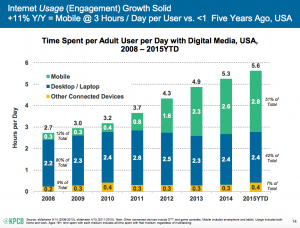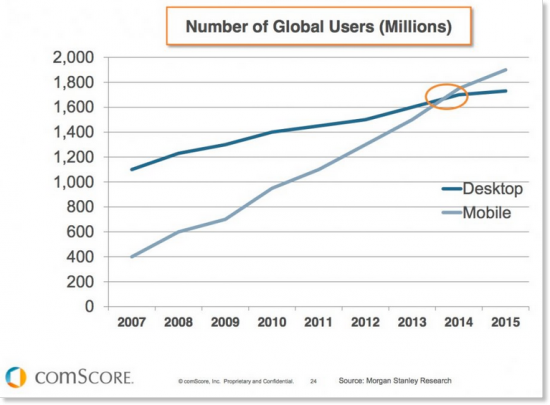Oozle Update: Google Announces Testing of a Mobile First Index

Who is this Update For?
If you’re a website owner, this is important for you. In fact, everyone that depends on Google for traffic to their website should be aware of a shift towards mobile Google announced and is currently testing.
User Behavior Has Shifted
 Google now receives more traffic from mobile devices than it does from desktops or laptops in the US. This is the main driver behind their new round of tests. Specifically, they are testing a new way of ranking websites using content from the mobile site as the primary source.
Google now receives more traffic from mobile devices than it does from desktops or laptops in the US. This is the main driver behind their new round of tests. Specifically, they are testing a new way of ranking websites using content from the mobile site as the primary source.

Review
To assess what this means let’s review a few things,
- Google doesn’t rank live websites, they rank a copy of websites they save. Google then groups them together in what is called an index.
- While Google used to save a mostly text and markup version of sites, they now load a webpage that looks more like what you and I see, and then saves it.
- Up to this point, Google used one version of the index that probably included your desktop version of the site as a primary source. Other information about your mobile site like whether it had mobile friendly version, or how fast the site loads was also included.
So What Has Changed
Now instead of primarily saving the desktop version and using that index, judge and determine rankings, they are running tests judging your content as it shows up on a mobile device. And while this is a test for now, At PubCon this year Google already announced their intent to use the mobile index as the primary index, so consider this a warning shot. You can’t dismiss this as a one off experiment.
What This Means in Plain English?
 Most people old enough to own and manage websites grew up looking at websites on desktop or laptop computers, the default version of the website in our brain is the desktop version. Visitor behavior no longer supports that idea. While the desktop version is still critically important, we as marketers need to reset our brain. We need to give at least equal importance to what our website looks like on mobile and tablets as we do to desktops and laptops. This also means that while your mobile website will soon be more important than your desktop site in the eyes of Google, it’s probably already more important in the eyes of your visitors.
Most people old enough to own and manage websites grew up looking at websites on desktop or laptop computers, the default version of the website in our brain is the desktop version. Visitor behavior no longer supports that idea. While the desktop version is still critically important, we as marketers need to reset our brain. We need to give at least equal importance to what our website looks like on mobile and tablets as we do to desktops and laptops. This also means that while your mobile website will soon be more important than your desktop site in the eyes of Google, it’s probably already more important in the eyes of your visitors.
What You Can Do About It?
Google gives several suggestions in their blog of what website owners can do to prepare for when these tests become the new reality.
You can see Google’s suggestions here.
A few takeaways from Google’s suggestions:
- Google states that those that have responsive sites don’t need to change anything. While this is mostly true, I would add a particular word of caution about how you handle the content on responsive sites. There has been a pretty regular practice of excluding large sections of content on mobile to reduce friction in user experience. Do so with caution, as the index shifts towards mobile first, you could be selling yourself short by excluding useful content Google could use to determine relevance.
- Google warns to ensure that all the work you’ve done to improve the technical SEO on your desktop site should be available to the Mobile User Agent. This is a problem we have seen from a lot of sites as they transition to Mobile they forget to ensure that things like analytics, Schema, canonical tags and other information makes it into the version of the site that loads for mobile users.
- A bad mobile site is worse than a good desktop site…kinda. This is essentially what is saying Google when they write “If you are building a mobile version of your site, keep in mind that a functional desktop-oriented site can be better than a broken or incomplete mobile version of the site.” They go on to suggest subtly, don’t launch a crappy mobile version of you site out of panic, especially if your desktop site shows up ok on a mobile device.
- If you don’t have a mobile version of the site, they say they will fall back on the desktop version. Be aware they will crawl the desktop version as if they were a mobile device. Google say, “If you only have a desktop site, we’ll continue to index your desktop site just fine, even if we’re using a mobile user agent to view your site.” To me this is a suggestion wrapped around an ominous warning. Anyone who has ever used a desktop version of a site on a mobile device knows that user experience suffers. What I hear when they say that is “Sure, if you don’t want to take the many, many warnings we’ve given you about mobile friendliness, we will just index your desktop site and shove it into a mobile browser. Then we’ll see if you pay attention when your rankings suffer”
Conclusions:
Plain and simple, it’s time to get your mobile website in order, if you haven’t done so already. We know sometimes this stuff can be a little tricky. If you don’t know what that means, talk with someone who does. We are happy to help explain. Let us know in the comments or fill out the contact us form on our site for a free evaluation. And as always follow us on social media for more updates.
Sources:
http://searchengineland.com/google-begins-experimenting-mobile-first-index-hopes-expand-upcoming-months-262527?utm_campaign=socialflow&utm_source=facebook&utm_medium=social
https://webmasters.googleblog.com/2016/11/mobile-first-indexing.html
https://adwords.googleblog.com/2015/05/building-for-next-moment.html
http://www.kpcb.com/blog/2015-internet-trends
